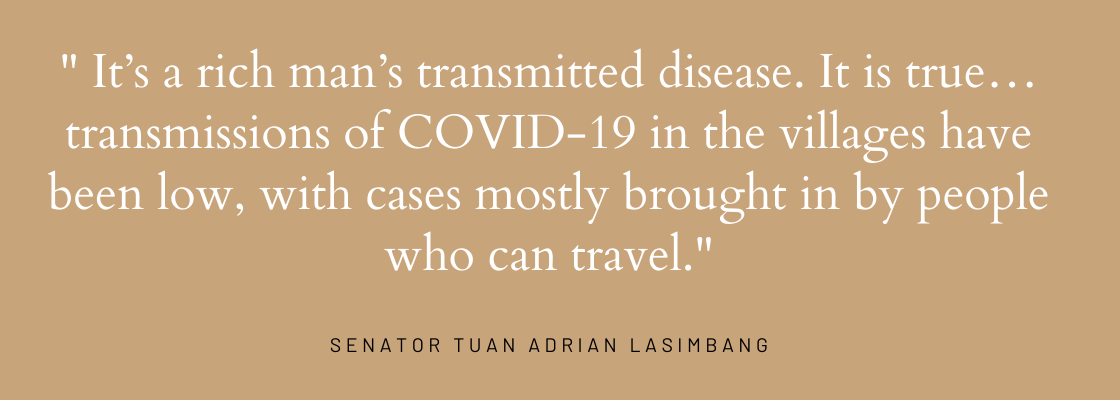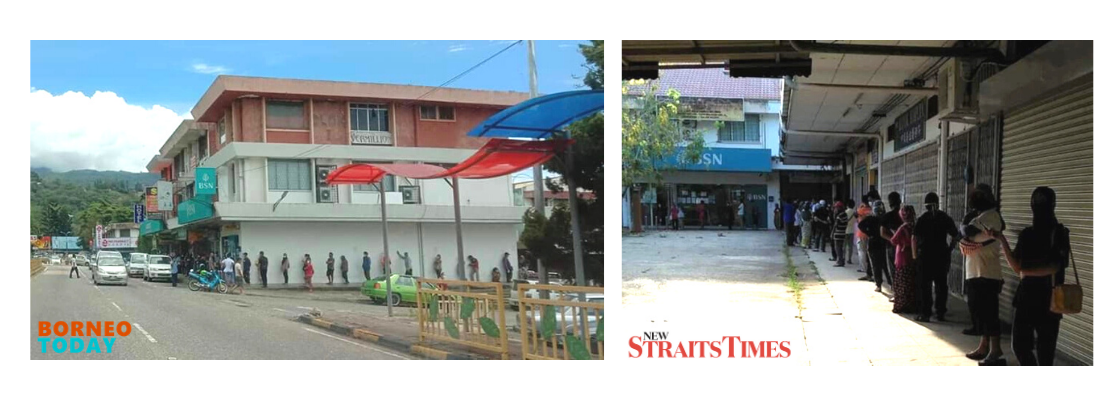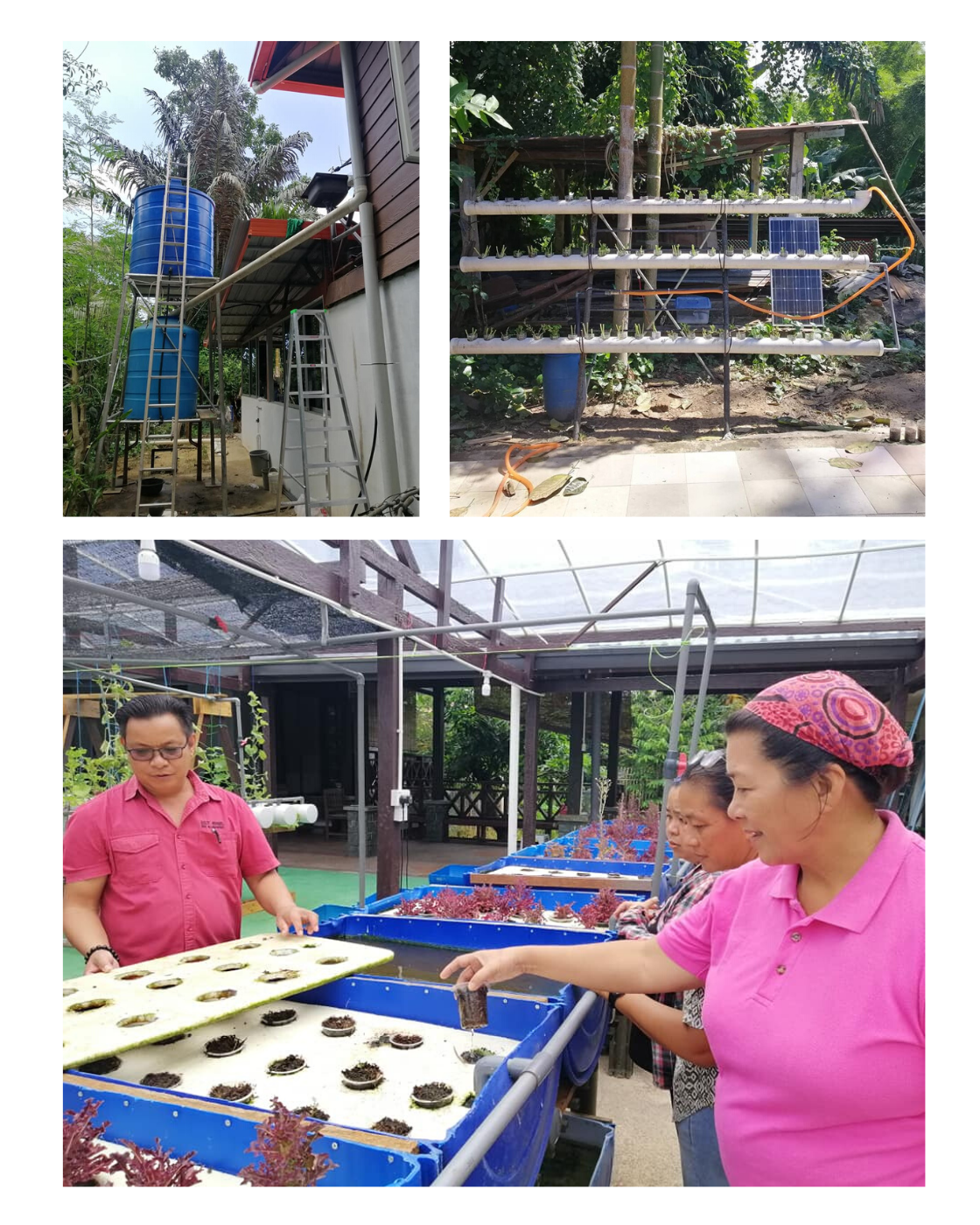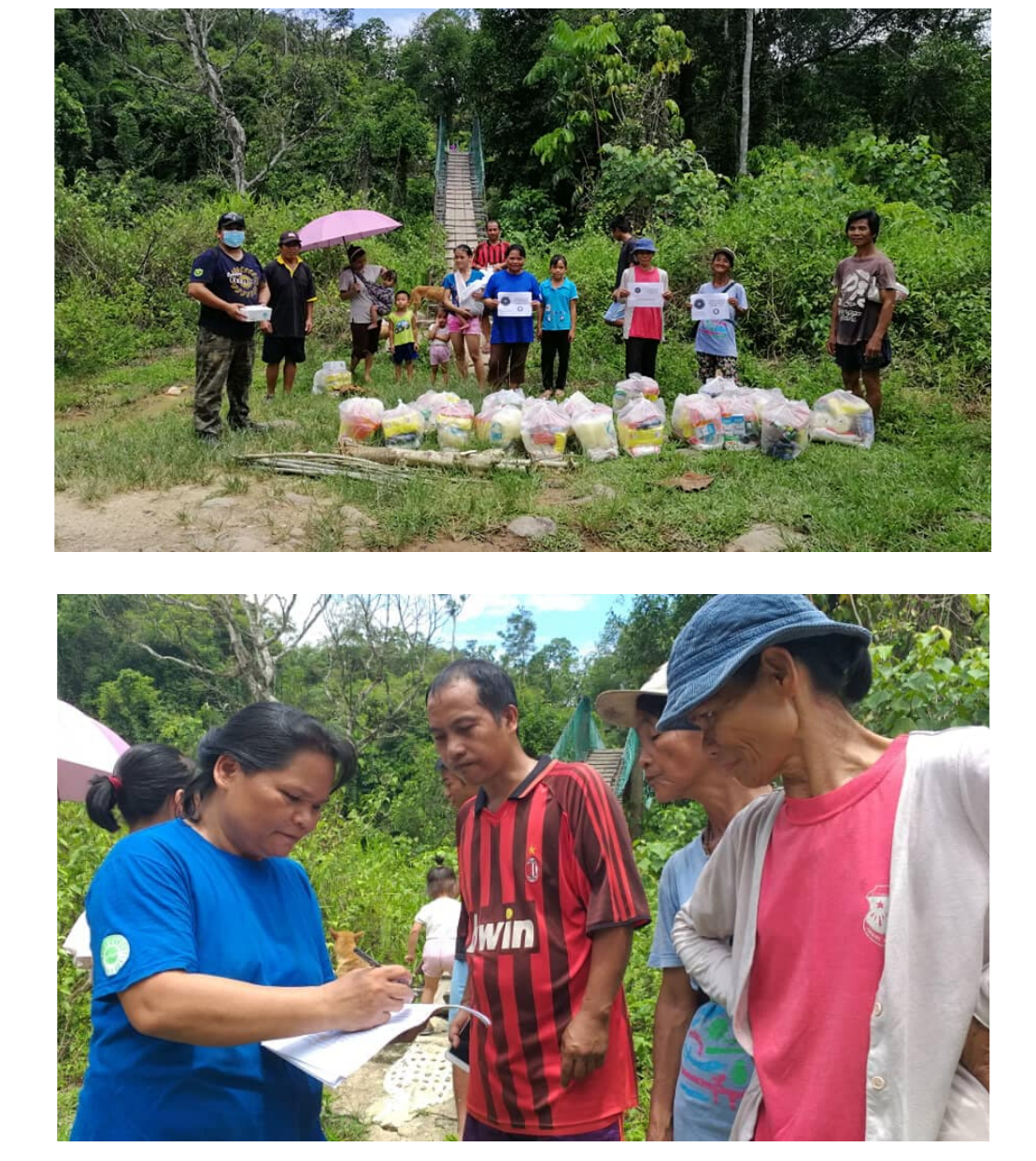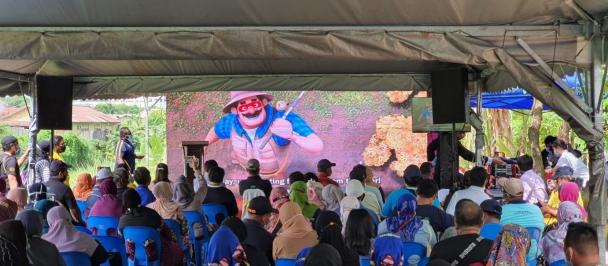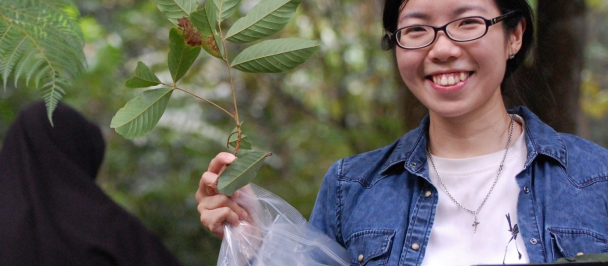That was said by Senator Tuan Adrian Lasimbang during an afternoon chat on Labour Day.
He had just returned home from sending aid to villagers on a public holiday, a day where others in the state of Sabah in Malaysia rest at home and prepare for the Kaamatan Festival, a month-long harvest festival celebrated annually there.
Effects of COVID on rural populations
COVID-19 has not directly impacted the orang kampung (villagers) in Sabah, with very few cases occurring in the state interior. Rather, the impact felt by rural and indigenous groups is a direct result of the Movement Control Order (MCO) enforced since 18 March 2020. Rural folk relying on small towns like Pensiangan and Nabawan for essential items that cannot be harvested from nature are cut off from the supply chain. Suppliers are restricted from sending goods into the rural areas. Likewise, rural farmers face difficulties transporting produce to the main markets in town, depleting their savings and ability to purchase other essential provisions.
The Malaysian government has responded by providing cash aid to vulnerable populations through the National Prihatin Aid package. However, the cost of retrieving cash assistance from the nearest banks dilutes the benefit to the orang kampung.
Villagers living in remote areas in Pensiangan and Nabawan have to undertake a full day of travel on poor road conditions for a round-trip to the nearest town. In the small town of Nabawan, only one ATM machine is available and is ironically overcrowded in a time of social distancing. Furthermore, the limited bank branches in rural areas frequently run out of cash. Even mobile agents, assigned by the Bank Simpanan Nasional (BSN/ National Savings Bank) in remote areas to distribute cash aid, are short of cash.
Long queue in rural areas as residents retrieve cash assistance from limited bank branches. Photo: Borneo Today and New Straits Times.
Food baskets promised by the Department of Social Welfare are not reaching the last mile due to disconnect in communication and databases between the federal and state governments. Social assistance databases are poorly coordinated, and many vulnerable individuals remain left out and are unable to enrol themselves into the list for various reasons. This snapshot of one district in Sabah reflects how well-intentioned policies fail when implementation neglects user points-of-need.
A glimpse of self-sustaining communities
From the food supply aspect
Fortunately, many villagers in the interior divisions are subsistence farmers—vegetables and livestock are in abundance. Skilled hunter-gatherers bring in game to share among the community. Forest medicines are used to cure illnesses. They are not short on food or medicinal supply and what they lack they often make up for with traditional knowledge, ancestral practices and coordinated community effort.
In the remote area of Kampung Buayan as an example, villagers have more than enough food: frozen wild boar meat from hunting, free-range farm chicken and fresh river fish. However, they are unable to sell these goods beyond the communal markets. PACOS Trust, a grassroots NGO, has been marketing this local produce via WhatsApp. Excess produce from village farms are mapped out, packed, and sent to the nearest town through authorised transporters.
For replenishment of commodities like salt and oil that are harder to produce locally, large supplies were sourced from community mini-marts and distributed to needy families. Though salt springs are available, the production process is too lengthy and tedious for crisis response. Stocks are then kept for months, mainly used as a preservative. When salt runs out, spices and traditional methods of smoking and drying are adopted to preserve meat for longer periods of time. Animal fats are used as alternatives to oil.
To maintain steady production of food at a relatively low cost, the villages at Kepayan and Penampang have been powered with electricity generated by micro-hydro and solar photovoltaic generators built by TONIBUNG, a local social enterprise. Restricted in movement but not in innovation, TONIBUNG team installed a solar-powered Direct Current (DC) Pump with timer to circulate fertiliser and water in hydroponic farms. The project started with the installation of a rainwater harvesting tank and pump to mist spray plantations around the house. This then inspired them to develop a communal hydroponic centre for Kepayan to support subsistence of the communities. Five low-cost residences have been identified for that project and a similar environment-friendly aquaponic project is underway.
Rainwater harvesting tank, solar-powered hydroponic system and work-in-progress aquaponic system. Photo: Adrian Lasimbang
From the social assistance aspect
Local representatives and civil society organisations, including NGOs and religious bodies alike, have stepped up efforts to meet the needs of the most vulnerable.
To ensure no one is left behind in receiving government aid due to lack of digital access and literacy, local representatives went back to basic participatory methods of mobilising volunteers to collect lists of deserving beneficiaries by going from house to house and setting up call and service centres for the elderly and disabled. Senator Adrian has been personally raising funds through his networks and approaching local grocery shops to prepare food items for collection and distribution to vulnerable groups within the villages. Meanwhile, NGOs and religious groups are focusing their assistance efforts on squatters, migrants, and undocumented persons who fall through cracks in the social protection system.
Delivery of food aid to Ulu Papar coordinated with pen, paper and volunteers. Photo: TONIBUNG
The rural population’s livelihoods are mainly in the informal sector, selling produce and delicacies in local markets fondly known as tamu. Assisting them to widen their customer reach and diversifying their products is another state priority to strengthen resilience. With the looming recession ahead and the uncertainty of when the health crisis will cease, Sabah’s state government is preparing ahead with a post-COVID-19 development programme, Sentuhan Kasih, worth USD 127mil to assist informal, micro and small enterprises in building back better. Micro grants are being provided to help these enterprises restock ahead of the lifting of conditional MCO. The state government also recently announced the creation of a digital economy unit with the mandate to boost internet connectivity. Earlier, the government had also launched the SabahPay platform that provides e-government services and facilitates marketing of local produce.
Ethnography lessons
1. Technology as an enabler for community resilience and building back better
Whilst it is inspiring to see how communities, civil society and state governments have come together to support each other, implementation needs to be improved to deliver social assistance and protect livelihoods of vulnerable groups where time and cost is not a luxury many can afford. In a scenario where movement is restricted and digital methods are the most efficient way to support business continuity and aid disbursement, how do we ensure no one is left behind?
The possibilities are endless, from food coupons that allow direct transaction with shops in multiple areas to e-tamu platforms. In remote areas, digital platforms are an attractive alternative to bank account transfers and mobile agents. These platforms can be the future for social aid delivery, reducing travel time and cost, improving cash liquidity, and enabling higher transparency and tracking of transactions. Speaking on general scepticism on the feasibility of digital solutions in rural and remote areas, Senator Adrian observes that many village families own smart phones that serve multiple purposes: communication, entertainment and education. The community has adapted their traditional form of bejalai, the practice of nomadic lifestyle from foraging the tropical jungle, to exploring livelihood opportunities in the urban jungle. Instead of bringing back game meat from the jungle, they are returning to their villages from urban centres with their technological ‘game’ in the forms of digital literacy and smart devices, which are common souvenirs brought back to families back home.
The crisis is an opportune time to overcome technophobia among rural communities and regain trust lost from previously unsuccessful digital transformation efforts. The stark supply chain and livelihood challenges unveiled by COVID-19 can be met by inclusive onboarding of stakeholders including the small and informal businesses to rebuild the ecosystems they need to thrive. Empowerment of the community in governance of digital systems and management of application outcomes are key success factors, apart from the necessary capacity building of digital skills and knowledge.
2. Values and social cohesion for community resilience
In a future crisis scenario where even digital solutions may fail us (cue Mission Impossible disruption of underwater cables and data servers), human comradeship and solidarity is what keeps us thriving in the most difficult of times. One valuable lesson we can learn from Sabah is the importance of resilient and socially cohesive communities in ensuring food and social security. Despite the lack of internet and digital solutions the community were able to mobilise themselves quickly through extended networks, willing volunteers, and close connection with vulnerable groups. The value of building communities that are self-sustaining does not lie solely in preservation of agricultural and survival knowledge, but in preservation of human connection and communal values, and the development of informal structures and systems for social cohesion that will help elevate the plights of vulnerable groups in a targeted and timely manner.
If we truly believe that healthy family units and community is what makes a nation stronger, we must invest in its development, however intangible and immeasurable the outcomes may seem. So, as technological innovation continues to run its course and policymakers work tirelessly in solving the social development conundrums, you and I can play the most critical part of loving our neighbours and investing in our community.
References:

 Locations
Locations
